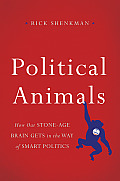
“How can they possibly think that way?” we scream. All of us. About all of them. Across both sides of the aisle. This month we offer you two books that delve deeply into the psychology of how our views shape, and are shaped by, our politics.
“Political Animals” by Rick Shenkman
(from the publisher) “…“Why, when it comes to politics, do we often seem so gullible and uninformed? In Political Animals, the bestselling historian and journalist Rick Shenkman reveals the hidden biases at work in all of us when we enter the voting booth. Drawing on cutting-edge research in neuroscience, evolutionary psychology, and behavioral psychology, he explains that evolution has left us with a brain wired for the Stone Age. While these ancient instincts often work to our advantage in our personal lives, in politics they usually dont. Modern cues set off ancient instinctive responses that prompt us to behave in ways contrary to the good governance of our nation.
Shenkman illuminates not only the curious habits of the American voter today but also the ways in which voter biases have shaped American political history from the shark attacks that got Woodrow Wilson elected to the people who still defend Richard Nixon against the Watergate charges. In so doing, Shenkman probes the depths of the human mind to reveal what we must do to fix our floundering democracy.”
“Politics, Lies and Conspiracy Theories: A Cognitive Linguistic Perspective” by Marcei Danesi
(from Salon.com) “One of the Republican Party’s most effective weapons in its campaign to end America’s multiracial pluralistic democracy is a media propaganda machine that functions as a closed episteme and echo chamber. Anchored by Fox News, the feedback loop exerts a powerful if not almost omnipotent level of control over its public’s beliefs, thoughts, values, behavior, and emotions. This is accomplished through a strategy of repeating lies, amplifying and circulating conspiracy theories, and encouraging violence and hatred against some type of Other.
Ultimately, Donald Trump and other right-wing neofascists, authoritarians, demagogues, and malign actors are political entrepreneurs who are leveraging a public that has been trained and conditioned over decades to respond to such leaders, messaging, and voices. Trump is a symptom of a much deeper problem in American politics and society, after all, not the cause. In this wide-ranging conversation, Danesi details how neuroscience, psychology, and linguistics can help us to understand why Donald Trump’s MAGA cultists and other right-wing voters and followers will likely not be abandoning him any time soon. Right-wing demagogues like Trump, Danesi explains, are able to use metaphors and repeated codes and tropes as part of a larger rhetorical strategy that manipulates and triggers their targeted public on an almost subconscious level. The implications are ominous for American democracy and civil society because such programming is very hard to counteract.”













